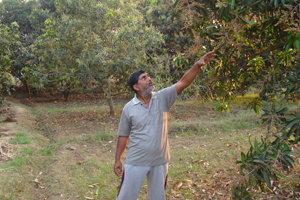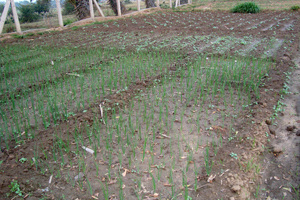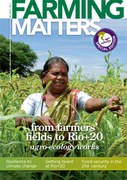There is a growing realisation that only the adoption of ecological and sustainable farming practices can reverse the declining trend in farm productivity in the state of West Bengal, India.

Their SAKRIA (meaning “active” in Bengali) organic farm sustains the needs of the family, is profitable, and allows their child to grow up in an environment free of pollution, chemicals and pesticides.
The farm grows a variety of seasonal crops and vege tables, with special focus on traditional varieties, appropriate to the conditions and the climatic situation. The different varieties of organic fruits grown on the farm ensure proper nutrition, providing the necessary vitamins and tasty food to the family. A variety of fishes are grown in the farm pond, completing the family’s nutritional requirements. Perennial trees are used as natural barriers against extreme weather conditions.
Farm yard manure and mulched leaves are used to fertilise the soil. Leguminous pulse crops are intercropped in the orchards and grown on a rotational basis, ensuring soil nitrogen fixation and also green manuring. No chemical pesticides are used.
The manual removal of weed goes hand in hand with the use of organic pesticide solutions and strategic intercropping (even though they face the serious problem of pests drifting onto their farm from other farm lands).

The farmers’ consistent extension efforts in the last fifteen years have led to many neighbouring farmers cultivating more varieties of crops and intercropping them with legumes. The soil condition in the area surrounding the farm has improved. The population of earthworms has substantially increased on SAKRIA farm, resulting in soils with a higher water holding capacity. The variety and diversity of plants and trees has also resulted in noticeable changes in area’s wildlife.
The SAKRIA organic farm may be a small family farm in a remote dry land area of West Bengal, but it demonstrates what can be achieved through love for the land and nature, self-determination, innovation and hard work. The success lies in the fact that the farmers have neatly interwoven their traditional knowledge with “modern” techniques. The main constraint they face is that customers are not ready to pay extra for their organic products, especially since organic certification services are lacking in the area. Most farmers feel that the organic certification processes are complex and expensive.
There is thus a need to enhance facilities and the availability of services for organic certification, and to help small-scale farmers so that they better market their products. If the farmers could also achieve higher prices for their produce, the benefits seen in SAKRIA would be even greater.
Text: Sabyasachi Roy
Sabyasachi Roy works at the National Dairy Development Board, VIII Block, Koramangala, Bangalore, India.
E-mail: sabyaroy@gmail.com

